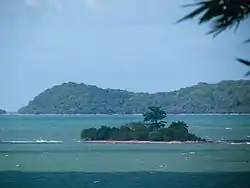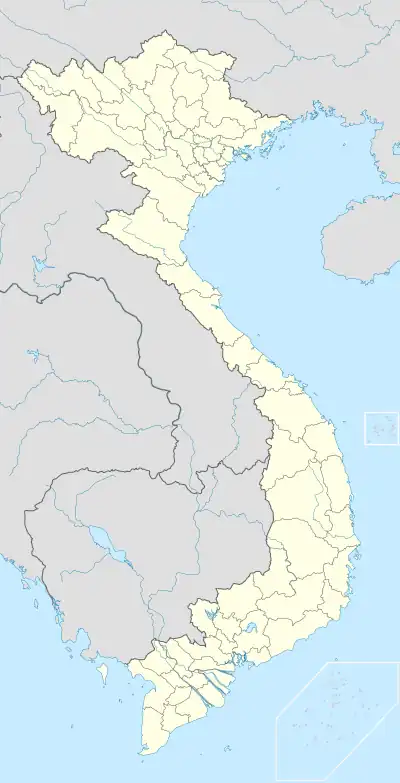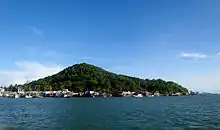Native name: Quần đảo Bà Lụa | |
|---|---|
 An islet of Bà Lụa Islands | |
 Bà Lụa Islands Position of Bà Lụa Islands | |
| Geography | |
| Location | Gulf of Thailand |
| Coordinates | 10°09′N 104°32′E / 10.150°N 104.533°E |
| Total islands | 34 or 42 |
| Major islands | Hòn Heo |
| Highest point | 124 meters (407 feet) on Re Lớn[1] or 113 meters (371 feet) on Hòn Heo[2] |
| Administration | |
Vietnam | |
| Province | Kiên Giang |
| District | Kiên Lương |
| Commune | Sơn Hải |
Bà Lụa Islands (Vietnamese: Quần đảo Bà Lụa) is an archipelago located in the Gulf of Thailand. It constitutes Sơn Hải Commune of Kiên Lương District, Kiên Giang Province, Vietnam. The archipelago is known as "(Small) Ha Long of the South".
Etymology
There are several different interpretations to the name of the islands. Some sources explain that Bà Lụa is the Chinese Vietnamese wife of an influential Frenchman coming here to exploit the area; since all of related legal papers were in her name, the islands was named Bà Lụa.[3][4] Author Anh Dong claims that Bà Lụa ("Lady Silk") is the name of a female general in charge of military logistics who established a silk mill on the islands in order to supply Nguyễn Trung Trực's militia force.[2] Another source says that around 1858, a feudal mandarin married a beautiful and gentle wife who wanted to stay away from the officialdom and eventually settled on the islands. Every day she raised silkworms and wove silk, so the islands has been called Bà Lụa ever since.[5]
Geography

The archipelago, formed from lower-mid Paleozoic sedimentary rocks,[1] consists of about 34[1] (or 42[2]) islands spreading out over a 70-square-kilometer (27 sq mi) water area.[1] The area of the islands is about 5 square kilometers (1.9 sq mi).[1] Hòn Heo is the largest entity. Re Lớn has the highest peak of 124 meters (407 ft).[1] Apart from Hòn Heo, none of the rest have a highest point exceeding 100 m (330 ft). The most populous islands are Hòn Heo, Hòn Ngang and Hòn Nhum.[2] The sea area around the archipelago is shallow, and in many places, people can even walk from island to island during low tide.[4]
Hòn Heo (literally "Pig Island") is the largest island of Bà Lụa. It is approximately 7 kilometers (4.3 mi) in circumference and has an area of 1.5 km2 (0.6 sq mi).[6] with a peak of 102 m (335 ft).[1] Its name originates from the fact that the French built a piggery on the island in 1918.[7] Here lies the People's Committee Head Office of Son Hai Commune.[6]
- Incomplete list of islands[8]
- Hòn Heo (largest island)
- Hòn Ba Rồ
- Hòn Bờ Đập
- Hòn Chướng
- Hòn Dê
- Hòn Dứa
- Hòn Đá Bạc
- Hòn Đầm Lớn
- Hòn Đầm Dương
- Hòn Đầm Giếng
- Hòn Đồi Mồi
- Hòn Đụng
- Hòn Đước
- Hòn Khô Cát
- Hòn Lò 1
- Hòn Lò 2
- Hòn Lò 3
- Hòn Ngang
- Hòn Nhum Bà
- Hòn Nhum Giếng
- Hòn Nhum Ông
- Hòn Nhum Tròn
- Hòn Ông Triều 1
- Hòn Ông Triều 2
- Hòn Ông Triều 3
- Hòn Sơn Tế 1
- Hòn Sơn Tế 2
- Hòn Thạch Mỏng
- Hòn Thơm 1
- Hòn Thơm 2
- Hòn Thơm 3
Administrative history
- On 14 January 1983, Kiên Hải District was formed with six communes including Bà Lụa Commune[9] that administered Bà Lụa Islands.
- On 27 September 1983, Bà Lụa Commune was renamed to Sơn Hải Commune (Kiên Hải District).[10]
- Since 17 August 2000, Sơn Hải Commune has been under the administration of Kiên Lương District.[11]
See also
References
- 1 2 3 4 5 6 7 "Bà Lụa" (in Vietnamese). Vietnam Institute of Lexicography and Encyclopedia. Archived from the original on 11 August 2017. Retrieved 13 May 2013.
- 1 2 3 4 Anh Dong 2010, p. 48
- ↑ Trần Văn Linh (20 June 2011). "Thử làm "ROBINSON" Tour du lịch chỉ có ở Kiên Giang" [Try doing "ROBINSON" Tour only in Kien Giang] (in Vietnamese). Kien Giang Department of Culture, Sports and Tourism's Website. Archived from the original on 25 September 2013. Retrieved 14 May 2013.
- 1 2 Đặng Hoàng Thám (30 June 2011). "Quần đảo Bà Lụa trong vịnh Hà Tiên" [Ba Lua Islands in Ha Tien Bay] (in Vietnamese). Saigon Times Online. Archived from the original on 25 September 2013. Retrieved 14 May 2013.
- ↑ KG. "Đảo Bà Lụa" [Ba Lua Island] (in Vietnamese). Ministry of Culture, Sports and Tourism of Vietnam's Website. Archived from the original on 26 September 2013. Retrieved 14 May 2013.
- 1 2 Đăng Khoa (7 August 2008). "Đến thủ phủ "vịnh Hạ Long phương Nam"" [To the capital of "Southern Ha Long Bay"] (in Vietnamese). Tuổi trẻ online. Archived from the original on 11 August 2017. Retrieved 14 May 2013.
- ↑ Anh Dong 2010, p. 49
- ↑ "Bản đồ hành chính. Phần bản đồ hành chính tỉnh Kiên Giang, huyện Kiên Lương" [Administrative maps. Part of the administrative map of Kien Giang province, Kien Luong district.] (in Vietnamese). Vietnam Government Web Portal. Retrieved 13 May 2020.
- ↑ "Quyết định của Hội đồng Bộ trưởng số 4/HĐBT ngày 14 tháng 1 năm 1983 về việc thành lập huyện Kiên Hải thuộc tỉnh Kiên Giang" [Decision of the Council of Ministers No. 4/HDBT dated January 14, 1983 on the establishment of Kien Hai district in Kien Giang province] (in Vietnamese). Ministry of Justice's Portal (Vietnam). Archived from the original on 25 September 2013. Retrieved 13 May 2013.
- ↑ "Quyết định của Hội đồng Bộ trưởng số 107-HĐBT ngày 27-9-1983 về việc phân vạch địa giới một số xã, phường và thị trấn Kiên Lương thuộc tỉnh Kiên Giang" [Decision of the Council of Ministers No. 107-HDBT dated September 27, 1983 on the demarcation of some communes, wards and towns of Kien Luong in Kien Giang province] (in Vietnamese). Cơ sở dữ liệu Luật Việt Nam. Retrieved 13 May 2013.
- ↑ "Nghị định số 33/2000/NĐ-CP của Chính phủ : Điều chỉnh địa giới hành chính huyện Kiên Hải và huyện Kiên Lương tỉnh Kiên Giang" [Decree No. 33/2000/ND-CP of the Government: Adjusting administrative boundaries of Kien Hai and Kien Luong districts, Kien Giang province] (in Vietnamese). Vietnam Government Web Portal. Retrieved 13 May 2013.
Bibliography
- Anh Dong (2010), Sổ tay địa danh Kiên Giang [Handbook of places in Kien Giang] (in Vietnamese), Hanoi National University Publishing House, ISBN 978-604-62-0291-2
External links
- Cruising Ba Lua Archipelago, 31 August 2011, Saigon Times Online
- Satellite image of Hòn Heo (Bà Lụa Islands), Google Maps